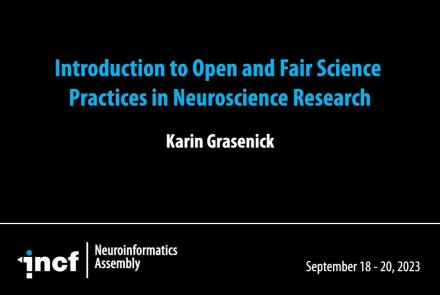Lesson type
Difficulty level
In this lesson, the simulation of a virtual epileptic patient is presented as an example of advanced brain simulation as a translational approach to deliver improved clinical results. You will learn about the fundamentals of epilepsy, as well as the concepts underlying epilepsy simulation. By using an iPython notebook, the detailed process of this approach is explained step by step. In the end, you are able to perform simple epilepsy simulations your own.
Difficulty level: Beginner
Duration: 1:28:53
Speaker: : Julie Courtiol
Course:
In this lesson you will learn how to simulate seizure events and epilepsy in The Virtual Brain. We will look at the paper On the Nature of Seizure Dynamics, which describes a new local model called the Epileptor, and apply this same model in The Virtual Brain. This is part 1 of 2 in a series explaining how to use the Epileptor. In this part, we focus on setting up the parameters.
Difficulty level: Beginner
Duration: 4:44
Speaker: : Paul Triebkorn
This lecture provides an introductory overview of some of the most important concepts in software engineering.
Difficulty level: Beginner
Duration: 32:59
Speaker: : Jeff Muller
Course:
This lesson gives an introduction to the Mathematics chapter of Datalabcc's Foundations in Data Science series.
Difficulty level: Beginner
Duration: 2:53
Speaker: : Barton Poulson
Course:
This lesson serves a primer on elementary algebra.
Difficulty level: Beginner
Duration: 3:03
Speaker: : Barton Poulson
Course:
This lesson provides a primer on linear algebra, aiming to demonstrate how such operations are fundamental to many data science.
Difficulty level: Beginner
Duration: 5:38
Speaker: : Barton Poulson
Course:
In this lesson, users will learn about linear equation systems, as well as follow along some practical use cases.
Difficulty level: Beginner
Duration: 5:24
Speaker: : Barton Poulson
Course:
This talk gives a primer on calculus, emphasizing its role in data science.
Difficulty level: Beginner
Duration: 4:17
Speaker: : Barton Poulson
Course:
This lesson clarifies how calculus relates to optimization in a data science context.
Difficulty level: Beginner
Duration: 8:43
Speaker: : Barton Poulson
Course:
This lesson covers Big O notation, a mathematical notation that describes the limiting behavior of a function as it tends towards a certain value or infinity, proving useful for data scientists who want to evaluate their algorithms' efficiency.
Difficulty level: Beginner
Duration: 5:19
Speaker: : Barton Poulson
Course:
This lesson serves as a primer on the fundamental concepts underlying probability.
Difficulty level: Beginner
Duration: 7:33
Speaker: : Barton Poulson
Serving as good refresher, this lesson explains the maths and logic concepts that are important for programmers to understand, including sets, propositional logic, conditional statements, and more.
This compilation is courtesy of freeCodeCamp.
Difficulty level: Beginner
Duration: 1:00:07
Speaker: : Shawn Grooms
This lesson provides a useful refresher which will facilitate the use of Matlab, Octave, and various matrix-manipulation and machine-learning software.
This lesson was created by RootMath.
Difficulty level: Beginner
Duration: 1:21:30
Speaker: :
This lesson discusses both state-of-the-art detection and prevention schema in working with neurodegenerative diseases.
Difficulty level: Beginner
Duration: 1:02:29
Speaker: : Nir Giladi
This lesson contains both a lecture and a tutorial component. The lecture (0:00-20:03 of YouTube video) discusses both the need for intersectional approaches in healthcare as well as the impact of neglecting intersectionality in patient populations. The lecture is followed by a practical tutorial in both Python and R on how to assess intersectional bias in datasets. Links to relevant code and data are found below.
Difficulty level: Beginner
Duration: 52:26
Course:
Maximize Your Research With Cloud Workspaces is a talk aimed at researchers who are looking for innovative ways to set up and execute their life science data analyses in a collaborative, extensible, open-source cloud environment. This panel discussion is brought to you by MetaCell and scientists from leading universities who share their experiences of advanced analysis and collaborative learning through the Cloud.
Difficulty level: Beginner
Duration: 55:43
This talk enumerates the challenges regarding data accessibility and reusability inherent in the current scientific publication system, and discusses novel approaches to these challenges, such as the EBRAINS Live Papers platform.
Difficulty level: Beginner
Duration: 18:08
Speaker: : Andrew Davison
In this lesson, you will learn about how team science unfolds in practice, as well as what are the standards and best practices used by teams, and how well these best practices function and support scientific output.
Difficulty level: Beginner
Duration: 15:21
Speaker: : Hannah Bayer
In this lesson, you will learn about approaches to make the field of neuroscience more open and fair, particularly regarding the integration of equality, diversity, and inclusion (EDI) as guiding principles for team collaboration.
Difficulty level: Beginner
Duration: 14:11
Speaker: : Karin Grasenick
This lesson discusses the topic of credit and contribution in open and FAIR neuroscience, looking through the respective lenses of systems, teams, and people.
Difficulty level: Beginner
Duration: 24:34
Speaker: : Tanya Brown
Topics
- Artificial Intelligence (6)
- Philosophy of Science (5)
- Provenance (2)
- protein-protein interactions (1)
- Extracellular signaling (1)
- Animal models (6)
- Assembly 2021 (29)
- Brain-hardware interfaces (13)
- Clinical neuroscience (17)
- International Brain Initiative (2)
- Repositories and science gateways (11)
- Resources (6)
- General neuroscience
(45)
- Neuroscience (9)
- Cognitive Science (7)
- Cell signaling (3)
- Brain networks (4)
- Glia (1)
- Electrophysiology (16)
- Learning and memory (3)
- Neuroanatomy (17)
- Neurobiology (7)
- (-) Neurodegeneration (1)
- Neuroimmunology (1)
- Neural networks (4)
- Neurophysiology (22)
- Neuropharmacology (2)
- Synaptic plasticity (2)
- Visual system (12)
- Phenome (1)
- General neuroinformatics
(15)
- Computational neuroscience (192)
- Statistics (2)
- Computer Science (15)
- Genomics (25)
- Data science
(24)
- (-) Open science (52)
- Project management (7)
- Education (3)
- Publishing (4)
- Neuroethics (35)




















